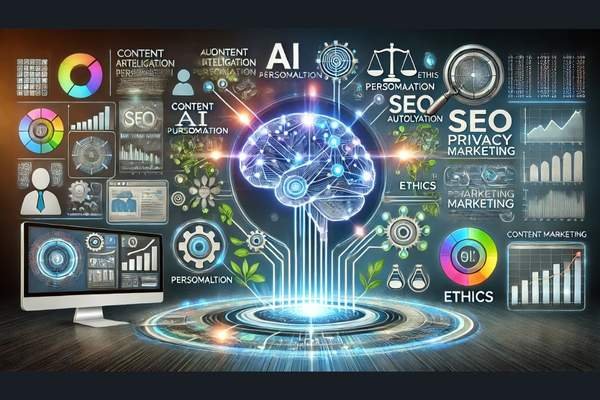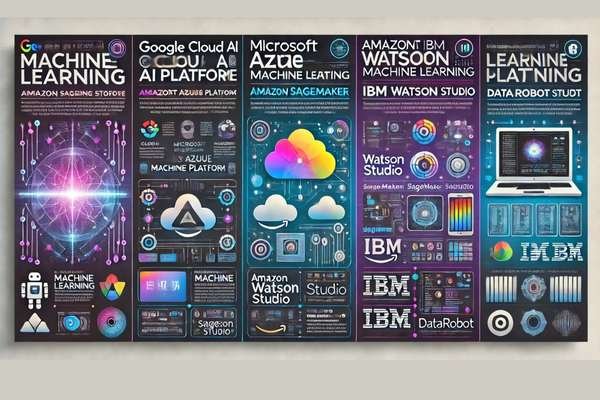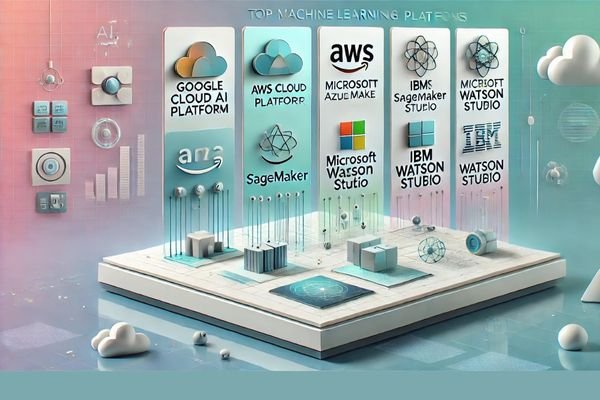
Human Agents vs AI Chatbots Which Works Best
September 20, 2024
Mastering AI for a Powerful Content Strategy
September 25, 2024Best Practices for Using AI in Your Content Strategy
AI (artificial intelligence) has changed many fields, and content marketing is no different. AI is changing how marketers, developers, and content creators work by making processes more efficient, personalization better, and opening up new creative possibilities. This article goes into great detail about how to use AI in your content plan in the best way, focusing on useful examples and important tips for success.
Table of Contents
1. Why AI should be a part of your content plan
In a very short time, AI tools have gone from being simple content ideas to full-on creative assistants. For people who work in digital marketing, AI can do many useful things, such as automating boring chores and making a lot of high-quality content at once.
1.1 Making Work More Efficient
Imagine that you’re in charge of a digital marketing company and finding it hard to meet the needs of all your clients. Content tools that are powered by AI can do boring jobs like writing social media posts or doing SEO analysis. By setting these jobs to do themselves, you can focus on strategy and creativity.
Take a look at this example: Sarah, a content planner, spends hours looking up keywords and making outlines for her team. Sarah can now make content plans and keyword lists in minutes thanks to AI tools. This lets her focus on coming up with creative content ideas that fit her clients’ brands.
1.2 Making Personalization Better
AI lets marketing make personalized experiences for a lot of people at once. AI tools can customize content suggestions by looking at how users behave and what they like. This makes sure that the right message gets to the right people at the right time.
Imagine an online store that uses AI to keep track of what customers like and how often they buy things. Based on how users have interacted with it before, the AI system offers blog posts and videos that those users might like. This much customization makes people more interested in the company and makes them more loyal to it.
1.3 Making Decisions Based on Data
Content planning isn’t just about coming up with new ideas anymore; it’s also about using data to make smart choices. With AI tools, you can look at very big datasets and find patterns and insights that you might not see if you did it by hand.
A well-known online media company was having a hard time figuring out what material their audience would enjoy the most. They found that their audience liked short-form, visual material more than long-form articles after putting in place an AI-driven analytics platform. Because of this new information, they changed their approach, which led to more engagement and traffic.
2. Tips for Using AI in Your Content Plan
2.1 Start with tools for making content
GPT-based models, like this one, are one type of AI-powered content generation platform that can write great blog pieces, ads, product descriptions, and more. These tools aren’t meant to take the place of writers; they’re meant to help them be creative.
Tip: Use AI to make rough drafts and outlines, and then add human thoughts and your brand voice to polish the content.
Try using AI-generated content at different points in the customer journey, from blog posts that raise awareness to landing pages that get people to buy.
2.2 Make use of AI to improve SEO
One of the most important parts of a content plan is search engine optimization (SEO). AI-powered tools can do SEO audits, come up with keyword ideas, and make sure that on-page content is optimized for the best exposure.
AI is used by tools like SurferSEO and Clearscope to look at the best material for certain keywords. With these tips in mind, you can make sure that your content not only meets the wants of your audience but also search engine algorithms.
2.3 Use AI to automatically share content
Consistent and timely release is one of the best ways to use content marketing. AI can schedule content automatically, share it across multiple channels, and find the best times to post based on how people interact with content. AI tools like Hootsuite and Buffer can help marketers get these jobs done quickly and easily.
Why spend hours distributing material by hand when AI can do it for you and optimize the timing and platform for the best results? Plan ahead and be creative with the time you save.
2.4 Use AI to check the content
Regular audits of the content to see what’s working and what needs to be changed are part of a good content plan. By automatically looking at traffic, engagement metrics, and other key success indicators, AI can make this process a lot faster and more effective.
Pro Tip: Tools like MarketMuse can help you improve your content by comparing it to the content of your rivals. This lets you keep older material relevant in a digital world that is always changing by updating it with little to no work.
3. Personalization in content marketing powered by AI
In this day and age, personalization is not just a “nice-to-have,” it’s a must. With AI-powered tools, it’s easier than ever to give each customer a personalized content experience, which boosts both interest and conversion rates.
3.1 Using AI to Make Dynamic Content
With dynamic content, web pages or emails change based on what the user wants, how they act, or information about their demographics. AI helps by using real-time data to make the material more relevant to each visitor, giving them a more personalized experience.
For example, if you run a travel website, AI can tell if a user is interested in beach vacations or city tours and show them material that fits their tastes. This amount of personalization makes it more likely that someone will convert.
3.2 Using AI to divide your audience into groups
Personalizing marketing requires dividing audiences into groups, but going through data by hand can take a lot of time. AI can quickly divide users into groups based on behavior, demographics, or psychographics, which lets marketers make content that is very specific to each group.
AI not only speeds up segmentation, but it also makes it more effective. AI makes sure that no chance for personalization is lost by looking at huge amounts of data.
3.3 How Predictive Analytics Can Help with Content Strategy
AI-powered predictive analytics can guess how users will act by looking at data from the past. This lets marketers guess what kind of content will do best, which helps them make better plans for their editing calendars.
Reader Question: If you could guess which blog post will go popular or which piece of content will get the most conversions, wouldn’t that be helpful?
4. Moral Issues to Think About When you use AI for content marketing
AI can be useful in many ways, but it’s important to keep social issues in mind when using it. As marketers, developers, and content creators, it’s our job to make sure that material generated by AI is morally sound.
4.1 The Openness and Disclosure
It’s important to say when AI was used to make or change material. Being honest with your audience builds trust and makes sure the material stays true to itself.
4.2 Bias in AI Systems
What you teach AI systems is what makes them good. If that data is biased, then the AI will make material that is biased. It’s important to check AI models for balance and make sure they include different points of view and don’t reinforce stereotypes.
4.3 Privacy of Data
Most of the time, AI needs huge amounts of data to work well. However, it’s important to protect users’ privacy and follow data security laws like GDPR.
Best Practices for Using AI in Your Content Strategy Comparaison
| Category | Use Case | Tools/Software | Benefits |
|---|---|---|---|
| Content Generation | Automate blog drafts, outlines, and product descriptions. | ChatGPT, Jasper AI | Speeds up writing and improves efficiency. |
| SEO Optimization | Analyze keywords, optimize meta descriptions, and structure content. | SurferSEO, Clearscope | Improves content visibility on search engines. |
| Content Scheduling | Automatically schedule and share content across platforms. | Hootsuite, Buffer | Saves time and ensures consistent posting. |
| Content Auditing | Analyze and improve existing content for better performance. | MarketMuse | Keeps content relevant and competitive. |
| Audience Segmentation | Divide audiences based on behavior and preferences. | HubSpot | Improves targeting and engagement rates. |
Frequently Asked Questions
1. How does AI make it easier to make content?
AI makes things more efficient by doing boring chores like research, SEO analysis, and writing drafts automatically. This frees up time for creativity and strategy.
2. Is content made by AI as good as content written by humans?
AI-generated material can be useful, but it works best when human input is added to it. AI can do jobs that are based on data, but people bring creativity and nuance to the table.
3. Can AI tell which content is going to go viral?
AI can guess what might happen based on past data and trends, but it can’t promise that something will go global. It helps with planning by giving information about how people use it.
4. When I use AI, what moral issues should I think about?
Some important ethical issues are being open about how AI is used, fixing bias in algorithms, and making sure that data privacy laws are followed.
conclusion
Artificial intelligence is changing content marketing by making it more personalized, efficient, and scalable than ever before. Using AI tools in your content strategy can help you automate boring jobs, be more creative, and learn a lot about how your audience behaves. However, it’s important to think about AI in an ethical way and keep a balance between technology and human touch. Using AI in content marketing while keeping true to your brand and audience is the way of the future.








